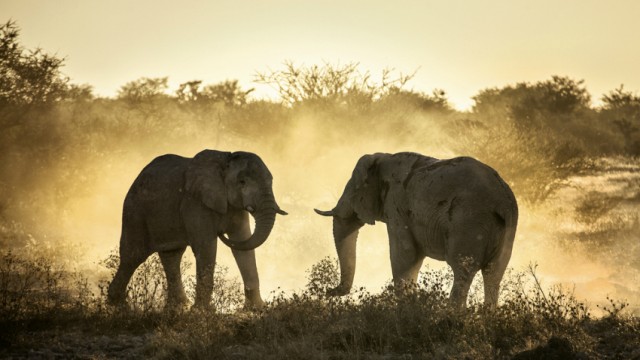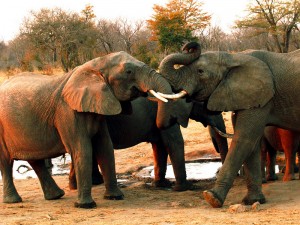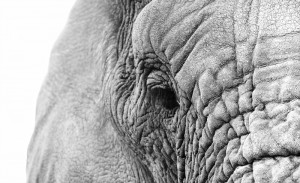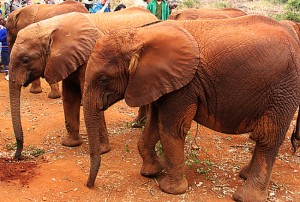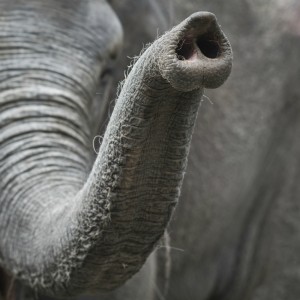African elephants (Loxodonta africana) are magnificent animals, but there’s so much more to them than just their impressive size and massive ivory tusks. Their incredible capacity for emotion and strong family ties make them unique among Africa’s wildlife … plus even more attributes you might be curious to learn about these gentle giants.
Sources: HuffingtonPost.com, SmithsonianMag.com, ElephantsForever.co.za, Wikipedia.org, ReidParkZoo.org, and MarylandZoo.org
This article originally appeared on AFKInsider.com.
They know how to self-medicate
Giving birth is hard, and after carrying a baby for 22 months (elephants have the longest gestation period of any mammal), those mamas are ready to get their kids out already. They’ve figured out that certain leaves in their natural habitats (from the family boraginaceae – whatever that means) induce labor, and will munch some down when they feel it’s time to kickstart the process. Sounds less painful than an epidural, no?
Elephants will dig graves and mourn their losses
Elephants are some of the only animals besides humans and monkeys that have death rituals, and it’s pretty incredible to see. Even when a herd member is sick, they will try to nurse it back to health with food and water, supporting it as they walk and stand. Once it’s no longer any use, they’ll create a shallow hole for the body and cover it was sticks and leaves and stand watch for several days. They’ve also demonstrated signs of depression after losing herd members with whom they had close relationships, demonstrating an incredible capacity for empathy.
There are definitely gay elephants
Often, same-sex relationships between elephants last longer than the heterosexual ones. Since African elephants primarily travel with herds of their own gender, their relationships with the opposite sex are often fleeting and purely for procreation (though there are some instances of family herds, in which s mother and father stay together with a baby). But in the meantime, relationships commonly form between elephants of the same sex, and include everything from affectionate trunk kissing and intertwining to mounting.
Elephants are actually just big nerds
Weighing in at 4,000-6,000 kilograms, elephants have the heaviest brains of all land animals — five kilograms — and use them. The complex structure includes a cortex that has just as many neurons as a human brain — accounting for their incredible problem-solving capabilities — and a large and complex hippocampus that allows for advanced emotions and memory.
They only have 4 teeth, but they’re replaceable!
With a diet made entirely of plants, it’s not necessary to have tons of sharp teeth (no antelope meat for these guys). But even gnawing on bark and leaves can wear teeth down, so elephants normally have between six or seven sets of teeth in their lifetime. The new teeth grow in behind the old ones and slowly push them out the front in pieces. Gross, but also very cool.
They’re not a fan of bugs
Despite being about a gajillion times bigger than an ant, elephants really aren’t fans of the bugs, and will take pains to avoid trees and plants that have big ant farms in them. Ants can crawl up an elephant’s trunk, which is seriously uncomfortable given the amount of nerve endings in them. Farmers have taken to lining their crops with beehives to keep elephants from eating or trampling the food, banking on their well-known aversion to bugs.
Elephants have an amazing capacity for altruism
More than caring for their own, elephants have shown an amazing ability to recognize other animals in distress and protect them. Stories have emerged about elephants saving dogs from ditches, protecting humans who have been injured, and even caring for orphans of other species. A lot of this can be traced back to their extraordinary brains that are eerily similar to humans’, but they definitely have something that is all their own.
Elephants take pains to protect their skin
Even elephants recognize the strength of the African sun. Slathering themselves with mud and sand helps protect their skin from the blistering sun and heat, and also provides a nice cooling mechanism. Their wrinkles even serve an important purpose: since African elephants lack sweat glands, wrinkles maximize the skin surface area that can be cooled and help accelerate the process.
They’ll mock you mercilessly
Parrots aren’t the only animals that will mimic what you say; African elephants use their trunks to make the deep rumbling and trumpeting noises that most are familiar with, but have also shown the ability to copy what they hear in their surroundings. Elephants in captivity that were located near a highway started making truck noises, and some have even been able to recreate words that their handlers have taught them. They also use contact calls with one another, creating unique noises that can be recognized even from great distances.
An elephant’s trunk is cooler than you could ever imagine
With more than 100,000 muscles and no bones (for comparison’s sake, the human body has less than 800 muscles total), an elephant’s trunk is seriously flexible and adept at handling just about anything the animal needs. But not only does it serve as an elephant’s eating utensil, super-powered smelling tool, and shower head — it can also be used as a snorkel in deep water, to show affection for others, or to exhibit dominance or submissiveness. With a tool like this, who needs opposable thumbs?
